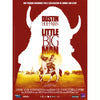Discover the Little Big Man Poster, a masterpiece of American cinema directed by Arthur Penn and released in 1970. This poster, representing the main character, Jack Crabb, played by Dustin Hoffman, is imbued with great emotional intensity which perfectly reflects the story of the film. “Little Big Man” is an epic journey through the American West, told through the eyes of Jack Crabb, a white man raised by an Indian tribe. The film addresses complex themes such as violence, racism and loss of cultural identity, while adding a touch of humor that makes this film a timeless masterpiece.
- Paper characteristic:
- 🎨 Canvas: world standard in terms of printing and imitating a “painting canvas” appearance .
- By default, the poster contains a 4 cm white border for framing (frame not included). If you don't want it, please choose "without white border".
- ✅ Size: several choices available . ✅
- Great UV resistance .
- Maximum color vibrancy, without reflections .
- Recycled paper, guaranteeing respect for the environment.
- Poster carefully packaged and delivered in a protective tube for total protection .
-
FREE STANDARD DELIVERY .
⚠️ Frame not included. ⚠️
Description of this Little Big Man Poster
Little Big Man is a 1970 American western film directed by Arthur Penn and based on the 1964 novel Little Big Man by Thomas Berger. Although broadly classified as western or epic, the film encompasses several literary/film genres, including comedy, drama, and adventure. The film follows the life of a white man who was raised by members of the Cheyenne Nation during the 19th century and then attempts to reintegrate into American pioneer society. The film is a parody of the Western film genre, contrasting the lives of white settlers and Native Americans throughout the progression of the boy's life. It stars Dustin Hoffman, Chef Dan George, Faye Dunaway, Martin Balsam, Jeff Corey and Richard Mulligan.
Little Big Man is an early revisionist Western in its sympathetic depiction of Native Americans and its exposure of the wicked practices of the U.S. Cavalry. The revision uses elements of satire and tragedy to examine prejudice and injustice. Little Big Man is an anti-establishment film of the era, indirectly protesting America's involvement in the Vietnam War by negatively portraying the American armed forces.
In 2014, Little Big Man was deemed "culturally, historically, or aesthetically significant" by the Library of Congress and selected for preservation in the National Film Registry.
"Little Big Man" is an American film directed by Arthur Penn, released in 1970. Adapted from the eponymous novel by Thomas Berger, the film traces the epic tale of Jack Crabb, a white man raised by a Cheyenne tribe in the American West in Nineteenth century. The film is a historical fresco that addresses complex themes such as violence, racism and the loss of cultural identity.
The film begins with the story of Jack Crabb, played by Dustin Hoffman, who introduces himself as a 121-year-old man in a circus. He then tells his story to a journalist, from his childhood to the time when he became a legend of the West. Jack's story is marked by tragic events, such as the massacre of his family by Indians, which push him to join a Cheyenne tribe. He is raised by Chief Old Lodge Skins, played by Chief Dan George, and takes the name Little Big Man.
Over the years, Jack learns the customs and traditions of the Cheyenne tribe, but he also witnesses the atrocities committed by the whites against the Indians, notably during the Battle of Little Big Horn in 1876. Jack is then captured by the Whites and becomes the guide of a group of soldiers, before joining a band of outlaws and becoming a buffalo hunter.
The film also addresses the question of Jack's cultural identity, who constantly finds himself torn between two cultures. He eventually joins the Whites, after learning of his family's death and discovering that his sister is still alive. He then witnessed the birth of the buffalo meat industry, which led to the destruction of millions of animals and the ruin of Indian tribes.
“Little Big Man” is a poignant film that offers a realistic and brutal vision of the American West in the 19th century. Dustin Hoffman's acting, along with the carefully reconstructed sets and costumes, make the film immersive and captivating. The music of composer John Hammond also contributes to the emotional atmosphere of the film.
In summary, “Little Big Man” is a classic of American cinema which offers a realistic and poignant vision of the history of the American West. The film addresses complex themes such as violence, racism and loss of cultural identity, and is carried by talented actors and haunting music.















 Free delivery
Free delivery
 Don't hang around! Nothing remains but
Don't hang around! Nothing remains but 



